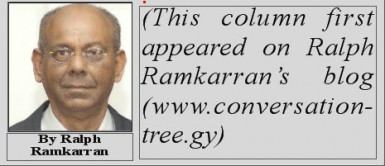It takes a certain mindset for a person to believe that he or she has the right to determine what information, otherwise lawful, that the citizens of Guyana should receive. Inculcated among some media practitioners and political operatives during the 1970s and 1980s, and pursued with vigour and venom between 2001 and 2015, this mindset is clearly alive and well in Guyana. State-owned media has long been seen as a party asset to be utilized for the benefit of the Government and Party in office.
 Given the opportunity to reject censorship, the Guyana Chronicle did the opposite. In justifying its failure to publish its own columnist, Dr. David Hinds, because it did not agree with the views he expressed on two occasions, it embarked on a paean to censorship in its editorial of April 20 entitled “The state newspaper.” It reiterated an earlier statement that “this newspaper is an arm of the state and will give primacy to the government’s agenda.” How is this different to the policy of the Chronicle during the eras mentioned above? The Chronicle is not an arm of the State. The State is merely a trustee of its owners who are the people of Guyana. I am a part owner of the Chronicle.
Given the opportunity to reject censorship, the Guyana Chronicle did the opposite. In justifying its failure to publish its own columnist, Dr. David Hinds, because it did not agree with the views he expressed on two occasions, it embarked on a paean to censorship in its editorial of April 20 entitled “The state newspaper.” It reiterated an earlier statement that “this newspaper is an arm of the state and will give primacy to the government’s agenda.” How is this different to the policy of the Chronicle during the eras mentioned above? The Chronicle is not an arm of the State. The State is merely a trustee of its owners who are the people of Guyana. I am a part owner of the Chronicle.
The editorial said that “editorial judgment needs to be exercised based on the need to enforce the newspaper’s policies and propriety in the society.” Supporting censorship, it said that “non-censorship is not unbridled” and in our fractured society the state media has “a duty of welding the people together.” The editorial said that the editors have challenges in balancing the “competing interests of those who desire their views and recount of history (to) be the dominant interpretation of reality.” A state employed journalist in 1979 or 2006 could not have put this mouthful better.
